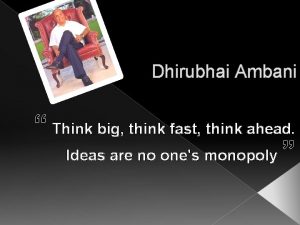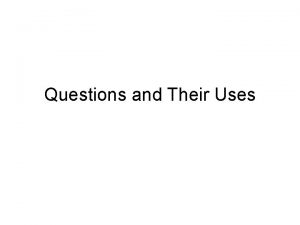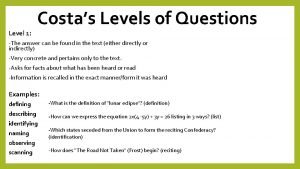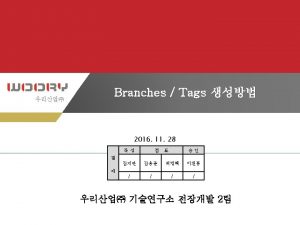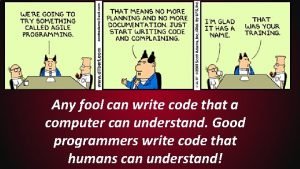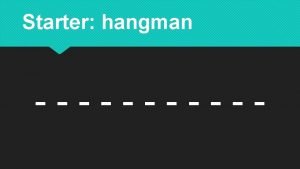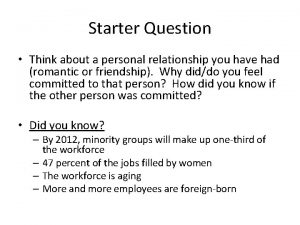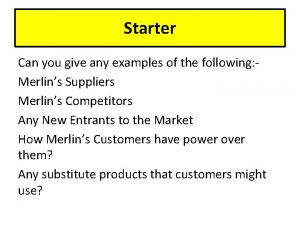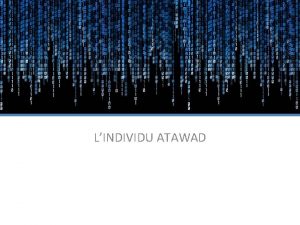Indentures Starter question Can you think of any











- Slides: 11

Indentures

Starter question Can you think of any job you would like to do when you’re older?

Starter question Do you think you have the freedom to choose any job you want? Why do you think this?

Apprenticeships and Indentures Apprenticeships have a long history, dating back to medieval times, with young people made to work for a master for a fixed time (usually seven years). There were many rules children had to agree to when they signed their indenture, which is a legal document that sets out these rules. Children had little or no say in the choice of apprenticeship, or master. A master did not have to pay them a wage, as the training provided was thought to be payment enough. The indentures give us a good insight into what happened to children after they left Blue Coat School, and what opportunities were available to them. They also serve to highlight the differences between education and childhood today and in the 18 th century.

Core Activity Using the material available on the My Bluecoat website, ask the children to read the rules that a Blue Coat School pupil would have to agree to follow when they entered an apprenticeship. Are these rules fair? How are these rules different from those followed in the workplace today? Once the rules and the idea of apprenticeship have been discussed, fill in indenture templates with a chosen – one to be pursued for seven years, with little or no pay. Think about what rules would apply to this chosen career and how would you feel having such an important decision made by someone else. Once the children have completed their indenture ask them to share their ideas with the group and discuss the differences between their indenture and the ones Blue Coat School pupils signed hundreds of years ago.

He shall not waste the Goods of his said Master nor lend them unlawfully to any. He shall not contract Fornication nor Matrimony contract within the said terms. He shall not play at Cards, Dice, Tables or any other unlawful Games, whereby his Said Master may have any Loss. With his own Goods or others, during the said Term, without License of his Said Master, he shall neither buy nor sell. He shall not haunt Taverns, Alehouses or Play-houses, nor absent him/herself from his said Masters Service Day or Night unlawfully. But in all Things as a faithful Apprentice, he shall and will behave himself towards his said Master and all his during the said Term. And the said Master during the said Term shall by the best Means or Method that he can, Teach or cause the said Apprentice to be Taught the Art and Mystery of a Merchant. And also shall find and provide unto the said Apprentice sufficient meat drink and lodging.

Blue Coat School apprenticeship indenture document, 1729

Extension Activity The children at Blue Coat School did not have the freedom to choose their own career. Discuss with the children why it is important to have freedom of choice and how the idea of freedom may have changed over the last 300 years. As a child today, what are you free to choose? As a child today, what are you not free to choose?

Freedom to choose Can you choose: - what you eat? - how you dress? - who you’re friends with? - your own hobbies? - what job you would like to do? - where you want to live? - how to spend your money? - to go on holiday? Would children at Blue Coat School be able to choose the same things as you?

End question How are the choices children can make about their lives today different from those children could make 300 years ago?

End question Do you think there are still children in the world who cannot make choices for themselves, and do not get given fair opportunities?
 If you think you can you can poem
If you think you can you can poem Mukesh ambani signature
Mukesh ambani signature Informational probes adalah
Informational probes adalah Have a daughter so you can argue
Have a daughter so you can argue So you think you can argue
So you think you can argue You can argue
You can argue Costas level 2
Costas level 2 Thank you for your attention if you have any questions
Thank you for your attention if you have any questions Any fool can write code that a computer can understand
Any fool can write code that a computer can understand If you can imagine it you can achieve it
If you can imagine it you can achieve it If you can't measure it you cannot improve it
If you can't measure it you cannot improve it If you can’t measure it, you can’t manage it
If you can’t measure it, you can’t manage it

